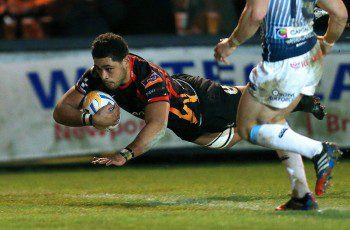
CARDIFF, WALES – After a saga stretching more than a year, peace has finally been declared in the Welsh civil war between the Wales Rugby Union and the regional authorities. The meat of the agreement promises the regions 60 million pounds over the next six years, with ten “dual” contracts to be shared between the union and the regions. Vitally, this resolves the awkward predicament of Sam Warburton, who has been allowed to return to training with the Cardiff Blues.
The contract between the two sides stretched for more than two hundred pages, reflecting the history of animosity and distrust between the two sides. Though WRU CEO Roger Lewis made all the right noises about co-operation and trust building, the civil war was sufficiently severe to bring Welsh rugby to the brink of destruction. Notably, Nigel Short, the chief of the regions, merely commented that he was “satisfied” compared with the flowery Lewis. Indeed, Lewis seemed determined not to acknowledge the existence of the deep fissure between the regions and their union, claiming instead that it was the “complicated” financial terms of the deal which necessitated blowing past the June 30 deadline for the previous participation agreement.
The WRU’s support of the regions grew from approximately six million pounds annually to nearly ten million pounds. Realistically, this increase was necessary for the regions to continue functioning in the modern rugby world. With French clubs snapping up Welsh talent at nearly a million pounds per year, the new participation agreement allows the regions to fire back. The nature of the dual contracts is a little more complicated. Sixty percent of the player’s contract will be paid for by the union, while the regions will be responsible for the other forty percent. This agreement mainly benefits the Ospreys and the Blues in the immediate future, but the impact will be enormous for the Dragons and Scarlets as well. Scarlets have suffered greatly in the past five years, failing to retain talent, while the Dragons have been unable to attract many players in the first place. Toby Faletau is the only Wales regular to feature for the Dragons, a circumstance that may change with the addition of four million pounds in contract funding.

The agreement also features a key proviso that attempts to address the decline of Welsh youth rugby; six hundred thousand pounds annually for the maintenance of the region’s academies. The Welsh U20 team has lagged behind England particularly, with the talent gap becoming more noticeable in the past few years. While past iterations of the side saw Sam Warburton, Leigh Halfpenny, and Dan Biggar makes their Wales debuts, the increase in funding for an academy system will only have a beneficial impact for young players.
It is difficult to think of any fans that will have major issues with the agreement. The only real pity is that it took so long to get here, and the process was unnecessarily destructive. Much of the blame must be laid on Roger Lewis, whose adversarial approach put the region’s backs against the wall from the outset. However, the regions do not come out of this fight with clean hands. Their refusal to acknowledge that they need to contribute to their own survival in the modern game was an alarming example of refusing to see reality. Fans of the game can only hope that we are not having the same conversations in 2020.

